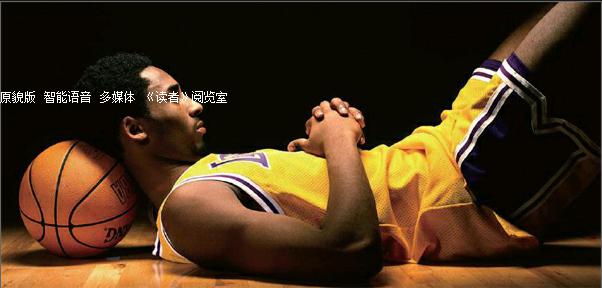站在边线之外

也许你是科比的铁杆球迷,也许你只是知道有个打篮球的叫科比,无论你对科比了解多少,相信你都不能否认科比头上的篮球巨星光环。除了天赋、热爱和勤奋铸就的卓绝球技,还有什么成就了万众瞩目的科比?
With Sunday's retirement announcement, Kobe Bryant's upcoming visit will be the last time he comes to Philadelphia as a professional basketball player. It is a time of reflection for those who knew him when he played at Lower Merion, who watched him evolve from a talented 13-year-old boy to an NBA-ready 17-year-old man.
I was an assistant coach on the Lower Merion team for Kobe's junior and senior seasons, and I have wonderful memories of the kid that I first met as an 8th grader. That first encounter was at the Jewish Community Center on Haverford & City Line, and I recall a boy who was fascinated with his new-found ability to jump up and touch the rim1). He did it about 50 times as he warmed up for a routine Saturday afternoon pickup2) game.
When the game started he played with a skill and savvy3) that belied4) his age. I was coaching at Wilmington College at the time, and thought that this skinny near 6-foot kid was about a junior in high school. It was the first of many times that Kobe would shock me when he told me in a barely audible5) whisper of a voice that he was 13 years old.
Three years later, and in large part for the chance to coach this prodigy6), I found myself as an assistant coach to Gregg Downer at Lower Merion. Gregg had done a brilliant job in setting a blueprint7) for Kobe's high school career and Kobe and his father Joe had bought in8) entirely. The skinny kid had grown in size, strength and national stature and I was looking forward to coaching him for his last two years of high school.
People often ask what it was like to coach Kobe in high school. It was awesome. The biggest compliment I can give him is that he would have been one of my all-time favorite players even if he was a terrible basketball player. His love of the game and passion for improvement became trademarks of his legacy, and they were all on display every game, every practice and every drill at Lower Merion.
A four-win freshman season gave way to a .5009) sophomore year. By Kobe's junior year, his reputation had grown and the expectations were high. We rode10) him to a 15-1 record in the Central League, 26-5 overall and into the second round of the state tournament.
The coaches would joke that he did something in practice every day that we had never seen before. We stacked11) the teams against him in drills, but he persisted. We sometimes changed the rules or the score in mid-drill to keep his team from dominating, and while the drill was still going on he would be yelling and screaming that we were cheating or that we had the score wrong.

There is an oft-told story of him chasing 5'7" Robby Schwartz through the hallways after a Schwartz turnover12) cost Kobe's team a victory in a drill. That story has grown legs over the years, but is based on real events and is a great example of Kobe's competitive nature. If you were keeping score, Kobe was playing to win.
Chester High was our kryptonite13), and a 27-point loss to them at Villanova in the District 1 championship in 1995 would fuel the fire of Kobe and his teammates until next year, his senior season. Kobe wasn't usually a loud or vocal leader—in a youthful and almost na?ve way it was unimaginable to him that someone would not have complete focus or effort—but the mere mention of Chester would fire him up.
His occasional eruptions would always get the team's attention. Two come to mind and offer a rare trip to the psyche14) of the future superstar.
One was a hot summer night in July of 1995. We had just played Chester in the championship game of the Plymouth Whitemarsh summer league, and they had beaten us again. Unlike the previous season where we were overmatched by the Clippers, we had a good chance to win this game.
But we did not win, and Kobe was not happy about it. When the coaches were done speaking he addressed the team, loudly. His message, "I am not losing to these [expletives15)] again!" He told his teammates, still loudly and with plenty of uncharacteristically foul16) language, that they had better get out and work their butts off17) and be ready to play when practice started in November.
We wound up playing Chester twice in his senior season and we won both times.
The other eruption came after a game at the Beach Ball Classic, a Christmas tournament in Myrtle Beach, South Carolina. Kobe fouled out late in the game against a good team from Oklahoma called Jenks. We led by a few points when Kobe went to the bench18), but proceeded to blow19) the lead and get manhandled in overtime.
Without our superstar, the Aces looked scared and played without poise20). It was a good wakeup call for the team, who had been enjoying the benefits of playing with the player who was now generally considered the best high school player in the country. Things like full outfits of gear from Adidas and the trip to South Carolina were being taken for granted, and the team was not focused on individually improving. The loss dropped our record to 4-3.
Kobe exploded on the team in a voice that was louder and angrier than I had ever heard him. "You can't back down!" he said over and over. "You gotta step up and take it to them!" It may sound trite21) but his tone and language were so uncharacteristic that it got everyone's full attention.
It was the best wakeup call the team could ever receive. Prior to that day they had looked at Kobe as a super talent, but now they started to see him for what he really was: a player whose incredible talent was exceeded by his work ethic, his passion and his irrepressible will to win.
That December game against Jenks would be the last high school game that the Aces would lose that season. We won 27 games in a row, culminating with a State Championship victory in Hershey.
The foundation for Kobe's superstardom22) was built in his time in the Philadelphia area. I was blessed to spend two years coaching him and his teammates, all of whom eventually took on Kobe's attitude that there is no room for second place. I have often said that Kobe is the most misunderstood professional athlete in the world. For all of the glitz23) and glamour of being a Laker and an NBA superstar, he is still the same kid I met at the JCC. He just wants his team to win.
科比·布莱恩特周日(编注:2015年11月30日)宣布了退役的决定,他即将踏上的费城之行将是他作为职业篮球运动员最后一次到访费城。对于那些从他在劳尔梅里恩高中打球时就认识他、看着他从一名13岁的天才少年成长为一名行将加入NBA的17岁青年的人们来说,这是一个充满回忆的时刻。
在科比的11、12年级两个赛季,我担任劳尔梅里恩高中篮球队的助理教练,对于这个初次见面时才上八年级的男孩,我有许多美好的回忆。我初次见到他是在哈弗福德和城界街上的犹太社区活动中心,我记得那是一个为刚刚发现自己跳起来可以触摸到篮筐而兴奋不已的男孩。在为一场周六下午例行的临时组织的比赛热身时,他把这个动作做了大约50次。
比赛开始了,他打球时的球技和智慧都掩饰了他的年龄。我当时在威尔明顿学院执教,以为这个身高接近六英尺的瘦小子已经差不多上11年级了。当科比用几乎听不见的声音低声告诉我他只有13岁时,我大吃了一惊,而这只是科比带给我的诸多震撼中的第一例。
三年后,我来到劳尔梅里恩高中当了格雷格·唐纳的助理教练,这在很大程度上是为了得到指导这位天才少年的机会。格雷格在为科比规划高中篮球生涯方面做得很出色,科比和父亲乔完全同意他的安排。当年那个瘦骨伶仃的孩子已经变高变壮,在全美有了声望,我很期待能够在他高中的最后两年指导他。
人们常常问我,做科比的高中教练是什么感觉。感觉好极了。我能给予他的最高赞美就是,即使他篮球打得不好,他也永远是我最喜爱的篮球运动员之一。他对这项运动的热爱和对提高球技的渴求成了他留下的精神的标记,在劳尔梅里恩的每场比赛、每次练习和训练中,他的这些精神都显露无遗。
在科比的九年级赛季,球队只赢了四场球,到了十年级赛季,球队输赢比例各半。到科比上11年级那年,他的名气已经大增,人们对他的期望也很高。我们依靠他带领球队取得了中部联赛15胜1负的成绩和26胜5负的总成绩,并在州锦标赛中打入了第二轮。
教练们开玩笑说,科比每天的训练内容都是我们前所未见的。我们在训练中安排参赛两队时故意不利于他,但他仍坚持不懈。有时,为了不让科比一队占优势,我们会在训练中途临时改变比赛规则或改动比分,而这时仍在场上训练的科比就会大声抗议,说我们作弊或是我们把比分计错了。
有一个经常被人说起的故事:在一次训练中,由于罗比·施瓦茨失球而导致科比那一队输球后,科比追着身高五英尺七英寸(编注:约一米七二)的施瓦茨满楼道跑。多年来这则故事流传颇广,不过它背后确有其事,是说明科比天性好胜的极好事例。只要还在计分,科比就要打赢。
切斯特高中队是我们的克星,1995年在维拉诺瓦的一区决赛上我们输给了他们27分,这次失利在科比和队友们心中激起的斗志一直燃烧到第二年科比读12年级的那个赛季。科比通常不是那种喜欢大声训斥别人的队长——他用一种年轻而稚气未脱的方式认为,有人在比赛中没有全力以赴是不可想象的——但是只要一提到切斯特高中队就会令科比大为光火。
他偶尔的发火总能吸引全队的注意。我想起两个这样的例子,它们为我们走进这个未来巨星的内心世界提供了难得的机会。
他的一次发火是在1995年7月一个炎热的夏夜。在刚刚结束的普利茅斯-怀特马什夏季联赛的决赛中,我们对阵切斯特高中队并再度落败。与上一赛季因为实力悬殊而输给快船队(编注:切斯特高中篮球队队名)不同,这次我们本来很有希望获胜。
但是我们没能取胜,科比对此很不高兴。教练训话结束后,他开始对队友们讲话,声音很大。他的大意是说:“我不要再输给这帮[此处将粗话略去]!”他一边一反常态骂骂咧咧,一边大声告诉队友,他们最好回去拼命练习,在11月恢复训练时拿出个样子来。
最后,在科比的12年级赛季,我们又跟切斯特队交过两次手,并且两次都赢了。
科比的另一次发火是在南卡罗来纳州默特尔海滩举行的圣诞赛事“海滩篮球经典赛”的一场比赛过后。在对阵来自俄克拉荷马的一支优秀球队詹克斯队的比赛中,科比在比赛后段因为犯规被罚下了场。科比坐到替补席时我们还领先几分,但在接下来的比赛中,我们不仅丢掉了领先优势,还在加时赛中被对手狠狠地修理了一番。
缺少了科比这张真正的王牌,王牌队(编注:劳尔梅里恩高中篮球队的绰号)看上去惊慌失措,打球乱了阵脚。对于这支因为拥有被公认为全美最好的高中篮球选手而沾了光的球队来说,这无异于一记当头棒喝。诸如由阿迪达斯提供全部运动装备、远赴南卡罗来纳参赛这样的事情都被队员们视作理所当然,他们没有把心思用在提高个人球技上。这场失利使我们的成绩降为4胜3负。
科比冲队友们大发雷霆,我从没听到过他声音这么大、这么愤怒。“你们不能畏缩不前!”他一遍又一遍地说。“你们应该上前去给他们点颜色!”他说的内容可能没有什么新意,但他的语气和用词却如此不同寻常,每个人都聚精会神地听着。
对队员们来说,这个警钟敲得正是时候。在那天之前,他们将科比视为一个超级天才,但那时他们才开始真正认识他,他是这样的球员:他的勤奋、他对篮球的热爱和他那不可遏制的求胜心超越了他所拥有的非凡天赋。
12月对詹克斯队的那场比赛是王牌队在那个赛季输掉的最后一场高中篮球赛。之后,我们连续拿下了27场胜利,最后在赫希赢得了州冠军。
科比巨星地位的根基是他在费城地区时就打下的。我有幸指导了他和他的队友们两年,他的所有队友们最后也都向他看齐,树立起勇争第一不做第二的态度。我常说科比是世上遭人误解最多的职业运动员。尽管作为一名湖人队队员和NBA巨星,科比拥有着耀眼的光环,但他依然是那个我在犹太社区活动中心遇到的男孩。他只是希望自己的球队获胜。
1. rim [r?m] n. <美>【篮】篮筐,篮圈
2. pickup [?p?k?p] adj. <口>临时拼凑成的
3. savvy [?s?vi] n. 理解;智慧;实际知识
4. belie [b??la?] vt. 使人对……产生误解;掩饰
5. audible [???d?bl] adj. 听得见的
6. prodigy [?pr?d?d?i] n. (有极大的音乐、数学、运动等天赋的)奇才
7. blueprint [?blu?pr?nt] n. 蓝图,行动计划
8. buy in: 采纳(尤指采纳有效、可行的意见) ,接受;同意,赞成
9. .500: 相当于0.500,在此指科比所在球队的胜负场数各半。这种数字写法是NBA赛季中表达球队胜率(即胜负之比)的一种方法。
10. ride [ra?d] vt. 依靠
11. stack [st?k] vt. (为达预期效果)不正当地安排(或选择)
12. turnover [?t??n??v?(r)] n. 【篮球、美式橄榄球】失球,丢球
13. kryptonite [?kr?pt?na?t] n. 氪星石。在关于超人的故事中,超人接近氪星石时会丧失特异功能。
14. psyche [?sa?ki] n. 心灵
15. expletive [?k?spli?t?v] n. 咒骂语
16. foul [fa?l] adj. 粗俗的(语言) vi. (比赛中)犯规
17. work one's butt off: 拼命干
18. bench [bent?] n. <美>替补队(员)席
19. blow [bl??] vt. <俚>把……弄得一团糟
20. poise [p??z] n. 镇定;沉着
21. trite [tra?t] adj. (观点、言语或故事)陈腐的
22. superstardom [?su?p?stɑ?(r)d?m] n. 超级明星的身份(或地位)
23. glitz [ɡl?ts] n. 闪耀,闪光

